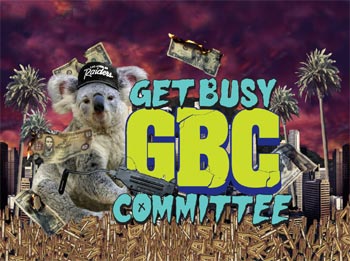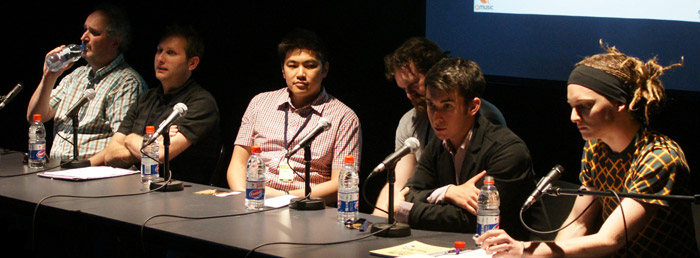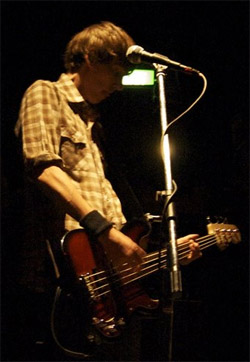A Conversation With Get Busy Committee, Los Angeles hip-hop group
 Koalas, uzis, and ‘Heartbeats’: Los Angeles-based hip-hop group Get Busy Committee (GBC) don’t mess around. Their 100% self-funded, self-released debut album Uzi Does It was released on their own label, Tokyo Sex Whale, and declared 2009’s ‘hip hop album of the year’ by Mike Shinoda of Linkin Park/Fort Minor off the back of their lead single ‘My Little Razorblade’ , which sampled the rhythmic pulse of Swedish electronic act The Knife’s distinctive track ‘Heartbeats’.
Koalas, uzis, and ‘Heartbeats’: Los Angeles-based hip-hop group Get Busy Committee (GBC) don’t mess around. Their 100% self-funded, self-released debut album Uzi Does It was released on their own label, Tokyo Sex Whale, and declared 2009’s ‘hip hop album of the year’ by Mike Shinoda of Linkin Park/Fort Minor off the back of their lead single ‘My Little Razorblade’ , which sampled the rhythmic pulse of Swedish electronic act The Knife’s distinctive track ‘Heartbeats’.
Consisting of underground rapper Apathy, Styles of Beyond‘s Ryu, and producer Scoop DeVille, GBC took the unlikely step of releasing the album in a USB uzi format that won them coverage on Wired, thereby reaching a tech-mad fanbase and creating buzz ahead of a digital album launch that saw Uzi Does It offered in mp3 form for just $1 via MySpace Music. Confused? Get busy. Below is an email conversation with the group, which was answered for the most part by Apathy.
Andrew: Hey GBC. I follow music industry news, I heard about you through guys like Bob Lefsetz (music industry commentator) and Ian Rogers (CEO of online music marketing company Topspin Media). Is it true that all publicity is good publicity, or were you weirded out by having a mid-50 year old guy like Bob write about you?
No way! Bob Lefsetz has been around long enough to have a good idea of what he likes, and I hope we’re on his good side! GBC does not age-discriminate, and we are definitely NOT for the kids!
Ian’s involvement and enthusiasm seems to have boosted your profile to a level that other acts might spend months or years developing. How important is his guidance and experience to the group?
In all honesty, Ian Rogers and the folks at Topspin have been the best thing to ever happen to our career. When in the past we would have a crazy idea, it would just stay a crazy idea. Ian is able to take a crazy idea, add sweet peppers and Giardiniera on top of a paper thin cut of beef, throw it in a French roll, and make a Chicago-style Italian beef sandwich out of it. (Sorry… Man V. Food is on in the background as I write this.)
We also have to thank our good friend Mike Shinoda [Linkin Park/Fort Minor] for linking us up with Ian!
“This is a marathon, not a sprint. Get Busy Committee hasn’t even played a live show since the record came out yet,” wrote Ian on his blog. Do you have an interest in the marketing and promotion side of things, or are you happy to let others take care of it while you work on the music?
Ryu: Yes, we are heavily involved with the marketing of the group. From the conception, it was very important to me that every detail of the group was carefully thought out. From the way we comb our hair, to the stylish clothes we wear. [A reference to their song ‘Stylish Clothes‘]
I also have a background in marketing/PR with the clothing brand True Love & False Idols. With GBC I wanted our image, logo (koala with uzi), website, and merchandise to be an extension of the brand. Everything is designed by our good friend and owner of TLFI (and sometimes GBC collaborator) Alex (2tone) Erdman. The marketing for this album has been a fun experience for us.
“Financially we’re doing slightly better than break-even at the moment, which means no one is making a bunch of money but we aren’t losing money, either,” wrote Ian in the same blog post. I take it that – having been in other groups – GBC have been realistic about the financial situations for musicians since you formed a couple of months ago?
We were very realistic financially with this album. The point was never to become rich off of the album; we just wanted to generate enough money to continue to raise awareness.

Hypothetically, what would it take for an independent hip-hop act like yourselves to be able to live off your music – touring, merch, record sales, etc? Is this even possible in 2010?
An artist being able to live off of [recorded] music, touring, merch, etc is a very real possibility in 2010, provided that the artist is patient, and the margin of profit works in the artists’ favour. It’s also important that you offer a product that people can’t live without. Everyone can live without a CD, but nobody can live without an uzi-shaped USB, with a free album included!
In the end, the funds you take is equal to the guns you make!
From an interview here: you said “‘My Little Razorblade’ is probably the worst recording ever. The vocals are all blown out.” What? Are you serious? Fuck pristine, I love the edge this track has. It’s the first thing I heard from you guys, and still my favourite. Was it difficult to clear the ‘Heartbeats’ sample? Have you heard any feedback from The Knife’s camp?
Thanks! Razorblade is one of our faves as well. We like the blown out vocals as well!
As for the sample? The Knife have been really cool for not suing the shit out of us. We assume they are familiar with the track, I think one of the band members follow us on Twitter! @GetbusycommittE
In that same interview, Ian stated that the album is “something that you guys have been working on for over a year; in your spare time, and across the country, and for essentially no money”. You later said “Don’t make a record, it’s the worst way to try to make a living.” What are your day jobs? Do they have any relation to your music?
We have been fortunate enough in this business to sustain us through the years: Styles Of Beyond, Fort Minor, Demigodz, as well as producing for outside artists have paid the bills for years. Some years are better than others, but we have been very fortunate thus far. Some of the things we do to earn money are:
Scoop DeVille: His production credits include Snoop Dogg’s ‘Life Of Da Party‘ and ‘I Wanna Rock‘, Fat Joe and Young Jeezy ‘Ha Ha‘, as well as upcoming tracks on albums from Busta Rhymes, The Clipse, Bishop Lamont, and of course the Get Busy Committee. Safe to say, the kid don’t need a day job.
Apathy: Shitloads of solo records including the recently released Wanna Snuggle? as well as upcoming albums with Army Of The Pharaohs, and the Demigodz. Production for Cypress Hill, Busta Rhymes and more. Your boy is good!
Ryu: Get Busy Committee, and PR/Marketing for True Love & False Idols.
You’ve all been part of the hip-hop scene for over a decade. You knew the music business pre-internet. It must be quite a change to work as GBC, whose marketing and promotional output is almost entirely online.
Yeah the marketing and promo has changed a lot, but we’ve been in the business long enough and have worked albums in just about every climate of the ever-changing music business, so the new way of doing things hasn’t come as a shock to us. It’s actually a welcome change after spending so much time on major labels. The new style of marketing is much better suited to a group like us. We love it.
Scoop, have you shown GBC material to Snoop or The Game? What kind of feedback have you been getting?
Scoop: Yeah I was just out in Miami recently with Fat Joe, DJ Khaled, Cool and Dre, and they loved the USB uzi! I should have brought more with me, everyone was taking pictures with them and shit! The industry is definitely taking notice of the moves we’re making. We’re actually working on a Get Busy Committee and Busta Rhymes song tonight! Shit is gonna be nuts!
Learn more about Get Busy Committee on their website. Follow them on Twitter at @GetbusycommittE, and watch their bittersweet debut video for ‘I Don’t Care About You’ below.
 Following my
Following my  “The reality is that the people who want to use those [illegal] services still can,” he said. “What we’re trying to do is implement a service that creates an option for the music industry to try and monetise the free stuff that everybody’s already getting, by getting advertisers to pay for it.”
“The reality is that the people who want to use those [illegal] services still can,” he said. “What we’re trying to do is implement a service that creates an option for the music industry to try and monetise the free stuff that everybody’s already getting, by getting advertisers to pay for it.” No Anchor
No Anchor
 Ian Rogers of Brisbane bands
Ian Rogers of Brisbane bands